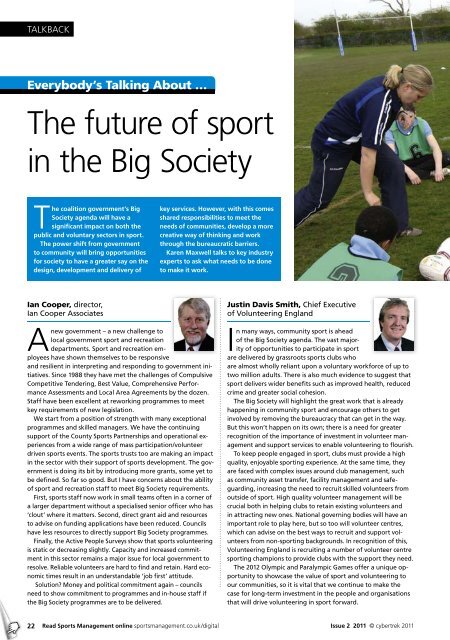Sports Management Q2 2011 - UUM
Sports Management Q2 2011 - UUM
Sports Management Q2 2011 - UUM
You also want an ePaper? Increase the reach of your titles
YUMPU automatically turns print PDFs into web optimized ePapers that Google loves.
TALKBACK<br />
Everybody’s Talking About …<br />
The future of sport<br />
in the Big Society<br />
T<br />
he coalition government’s Big<br />
Society agenda will have a<br />
significant impact on both the<br />
public and voluntary sectors in sport.<br />
The power shift from government<br />
to community will bring opportunities<br />
for society to have a greater say on the<br />
design, development and delivery of<br />
Ian Cooper, director,<br />
Ian Cooper Associates<br />
A<br />
key services. However, with this comes<br />
shared responsibilities to meet the<br />
needs of communities, develop a more<br />
creative way of thinking and work<br />
through the bureaucratic barriers.<br />
Karen Maxwell talks to key industry<br />
experts to ask what needs to be done<br />
to make it work.<br />
new government – a new challenge to<br />
local government sport and recreation<br />
departments. Sport and recreation employees<br />
have shown themselves to be responsive<br />
and resilient in interpreting and responding to government initiatives.<br />
Since 1988 they have met the challenges of Compulsive<br />
Competitive Tendering, Best Value, Comprehensive Performance<br />
Assessments and Local Area Agreements by the dozen.<br />
Staff have been excellent at reworking programmes to meet<br />
key requirements of new legislation.<br />
We start from a position of strength with many exceptional<br />
programmes and skilled managers. We have the continuing<br />
support of the County <strong>Sports</strong> Partnerships and operational experiences<br />
from a wide range of mass participation/volunteer<br />
driven sports events. The sports trusts too are making an impact<br />
in the sector with their support of sports development. The government<br />
is doing its bit by introducing more grants, some yet to<br />
be defined. So far so good. But I have concerns about the ability<br />
of sport and recreation staff to meet Big Society requirements.<br />
First, sports staff now work in small teams often in a corner of<br />
a larger department without a specialised senior officer who has<br />
‘clout’ where it matters. Second, direct grant aid and resources<br />
to advise on funding applications have been reduced. Councils<br />
have less resources to directly support Big Society programmes.<br />
Finally, the Active People Surveys show that sports volunteering<br />
is static or decreasing slightly. Capacity and increased commitment<br />
in this sector remains a major issue for local government to<br />
resolve. Reliable volunteers are hard to find and retain. Hard economic<br />
times result in an understandable ‘job first’ attitude.<br />
Solution? Money and political commitment again – councils<br />
need to show commitment to programmes and in-house staff if<br />
the Big Society programmes are to be delivered.<br />
22 Read <strong>Sports</strong> <strong>Management</strong> online sportsmanagement.co.uk/digital<br />
Justin Davis Smith, Chief Executive<br />
of Volunteering England<br />
n many ways, community sport is ahead<br />
of the Big Society agenda. The vast major- I ity of opportunities to participate in sport<br />
are delivered by grassroots sports clubs who<br />
are almost wholly reliant upon a voluntary workforce of up to<br />
two million adults. There is also much evidence to suggest that<br />
sport delivers wider benefits such as improved health, reduced<br />
crime and greater social cohesion.<br />
The Big Society will highlight the great work that is already<br />
happening in community sport and encourage others to get<br />
involved by removing the bureaucracy that can get in the way.<br />
But this won’t happen on its own; there is a need for greater<br />
recognition of the importance of investment in volunteer management<br />
and support services to enable volunteering to flourish.<br />
To keep people engaged in sport, clubs must provide a high<br />
quality, enjoyable sporting experience. At the same time, they<br />
are faced with complex issues around club management, such<br />
as community asset transfer, facility management and safeguarding,<br />
increasing the need to recruit skilled volunteers from<br />
outside of sport. High quality volunteer management will be<br />
crucial both in helping clubs to retain existing volunteers and<br />
in attracting new ones. National governing bodies will have an<br />
important role to play here, but so too will volunteer centres,<br />
which can advise on the best ways to recruit and support volunteers<br />
from non-sporting backgrounds. In recognition of this,<br />
Volunteering England is recruiting a number of volunteer centre<br />
sporting champions to provide clubs with the support they need.<br />
The 2012 Olympic and Paralympic Games offer a unique opportunity<br />
to showcase the value of sport and volunteering to<br />
our communities, so it is vital that we continue to make the<br />
case for long-term investment in the people and organisations<br />
that will drive volunteering in sport forward.<br />
Issue 2 <strong>2011</strong> © cybertrek <strong>2011</strong>


